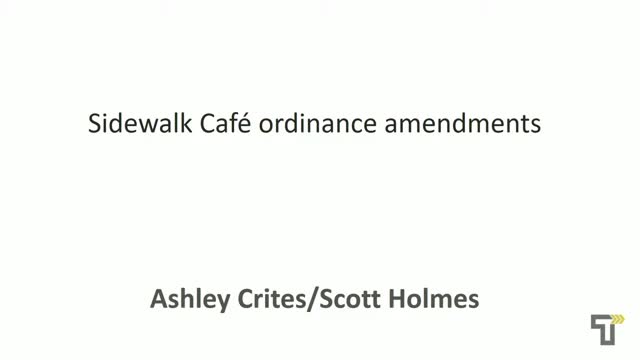Council reviews sidewalk cafe ordinance redlines and fee models; asks staff to return options
Get AI-powered insights, summaries, and transcripts
Subscribe
Summary
Staff presented redline edits to the sidewalk cafe ordinance and a fee study; councilmembers asked staff to return with detailed fee options and ordinance language for the committee on the 18th.
Staff member Ashley presented proposed redline edits to the sidewalk cafe ordinance and a companion fee study. She said the packet includes draft text but that the council did not need to act today; staff recommended returning the ordinance for committee consideration on the 18th and focused discussion on fees during this meeting.
Key proposed ordinance changes described by Ashley included clarifying that a right-of-way use permit does not authorize commercial use as a sidewalk cafe unless a sidewalk-cafe permit is also granted; prohibiting new sidewalk-cafe permits for establishments classified as "bar," "club," or "private event space" under the new zoning code (existing permitted cafes would be grandfathered); and retaining a 6-foot unobstructed pedestrian pathway requirement.
On physical configuration, staff proposed removing confusing language about tree grates and borders and instead requiring that barriers run in a continuous straight line perpendicular to the building wall, that barriers connect to the outer barrier in straight lines, and that barriers be affixed to the sidewalk in a manner approved by the city.
Sanitation and maintenance proposals included making applicants responsible for keeping their sidewalk-cafe area neat and clean and adding a quarterly pressure-washing requirement. On furnishings, staff recommended requiring uniform furniture design within a single cafe area.
At Chief Blankley's request, staff proposed banning glass bottles containing alcoholic beverages other than wine (for example, beer bottles) within sidewalk-cafe spaces. Staff also proposed clarifying that sidewalk cafes cannot be used for queuing and that a business must choose between a queuing permit and a sidewalk cafe in the same area. The queuing-permit start time was proposed to move from 11 p.m. to 9 p.m. at the request of public-safety staff.
On fees, Ashley said the city currently charges a $150 application-processing fee (adjusted for CPI to $156) and a licensing fee set in 2022 of $1.00 per square foot, now $1.04 after CPI adjustments. Staff presented benchmarking from five Alabama cities and examples elsewhere (Asheville, Athens, New Orleans, Oxford), which use a range of fee models including per-table charges, per-square-foot rates, market-rate rents, and multi-year contracts often indexed to CPI.
Staff ran example calculations for local businesses showing how different models would affect fees. Councilmembers raised concerns that charging market-rate rent could harm small businesses or drive up consumer costs; others noted substantial variation by location and season, including a large student population that causes sharp seasonal revenue swings.
Councilmembers suggested predictability and automatic indexing (for example, multi-year contracts with CPI adjustments) to avoid annual revisits. One councilmember asked staff to return specific fee options and scenarios at the committee meeting on the 18th; staff agreed. The meeting did not record a final vote on ordinance text or fee levels.
Speakers noted the civic value of vibrant outdoor dining while balancing taxpayer ownership of the right-of-way and the city's costs for policing, cleaning and repairs. Staff underscored the city is not currently capturing market value for use of public sidewalks and recommended a gradual, predictable approach to any fee increases.
Staff will return to the council with detailed fee options and proposed ordinance language for committee consideration on the 18th.
